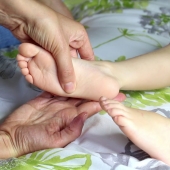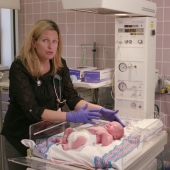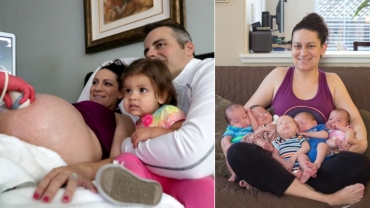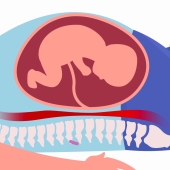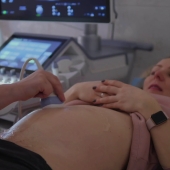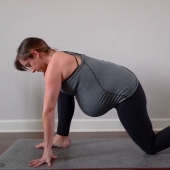Pregnancy is a good time to think about what you're eating. What you eat now will help your baby to grow healthy and give them the best start in life and help you to feel your best. Eating healthfully and pregnancy does not mean going on a special diet and there's no need to eat for two.
Aiming for three meals a day with two or three snacks if you're feeling hungry. It'll provide the nutrients you and your baby need overnight. Try not to leave it longer than 12 hours between eating a meal or a snack.
If you do not usually eat breakfast try a small snack to get you started. The food and drink we eat can be divided into six groups. Base your meals around starchy carbohydrate whole grain or higher fiber options which may help prevent constipation. These will give you and your growing baby energy and help stop you feeling sick.
Examples include potatoes, bread, rice, pasta, yam butch, patties. Try to have 5 portions of fruit and vegetables a day fresh frozen tins and dried all count. These will be good for you and your baby as they are full of vitamins, mineral and fiber.
If you drink it, fruit juice should be one glass a day. This counts as one of your five a day and also goes towards your recommended fluid intake. It is important to include protein at two of your meals, each day protein is good for your baby's overall growth and can include a good source of fiber which helps baby's brain development. Beans pulses fish eggs meat and other protein such as nuts corn and tofu are included in this group.
As a rough guide a portion is considered three tablespoons of pulses or two eggs or a palm-sized piece of meat or fish try to have oily fish such as salmon or mackerel one or two times a week.
Including dairy and other calcium containing foods helps build teeth and bones for your baby and looks after yours too. You need three portions a day. A portion is about 200 mils of milk, 150 grand pot of yogurt or 30 grams of cheese. A piece the size of yourself.
Unless you are underweight choose low-fat versions. If you prefer soya alternatives check that they have calcium added. Non-dairy foods that have some calcium include tahini, spinach, broccoli, tofu, beans, dal, sardines almonds and dried fruit.
Oils and spreads should be kept a small amount. Choose unsaturated oils and low-fat breads where possible. Avoid foods high in fats and sugars such as cakes, biscuits, sweets and crisps to minimize unnecessary weight gain.
Ensure that you drink plenty about eight glasses a day. Increasing this if you are being sick or if you're doing exercise water, tea, skimmed or semi skimmed milk are good choices. Fizzy drinks are not recommended.
The amount of weight gained in pregnancy is dependent on the mother's weight at the start of the pregnancy. Overweight ladies should gain about 6 kilograms, normal weight ladies about 12 kilograms and underweight ladies about 19 kilograms. It is important not to gain too much weight.
If you have concerns ask to be referred to a dietician. The UK guidelines recommend that pregnant women should not drink alcohol at all and for those planning pregnancy the safest option is to avoid alcohol.
If you drink heavily in pregnancy your baby could develop a group of problems known as fetal alcohol syndrome which include poor growth, learning and behavioural difficulties. If you have any concerns about alcohol in early pregnancy speak your midwife.
There are two supplements which are needed in pregnancy. Folic acid and vitamin D. Folic acid helps prevent neural tube defects and should be taken before pregnancy and up until week 12 of your pregnancy a 10 microgram vitamin D supplement taken throughout your pregnancy will help your baby's teeth and bones grow properly and will keep yours healthy too.
There are some foods you should avoid in pregnancy. We know it is important to include fish in the diet but be careful not to have shark Marlin or sword fish and restrict can unit for medium can per week. Avoid raw and partially cooked eggs and dishes containing these such as mooses or homemade mayonnaise. Also avoid raw shellfish and raw or undercooked chicken.
Do not have unpasteurized dairy products and avoid soft ripened cheeses such as brie, camembert, blue-veined cheeses and some goat cheese. All types of pate including vegetable should be avoided. Soft ice cream from a tub from the supermarket is fine as long as it's been made with pasteurized eggs and milk.
However avoid ice cream from machines fans or kiosks. Take care with drinks to ensure that you don't have more than 200 micrograms of caffeine daily that is no more than two mugs of coffee or three cups of tea a day. Limit chocolate, Cola and high energy drink.
Eating a varied diet from the main food groups is enough to keep you and your unborn baby healthy. Make sure that you take the recommended supplements and keep an eye on food safety. There is more information on the British Dietiticians association website with links to other useful resources.
- 1477 views


